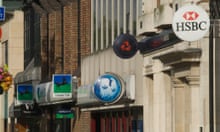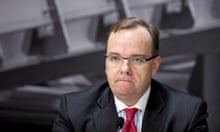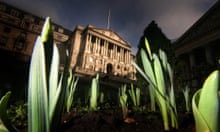What vision of financial catastrophe has the Bank of England invoked this year as it tests banks’ ability to withstand shocks? Is it a collapse in UK prices provoked by the popping of the London property bubble? Or a breakup of the eurozone triggered by a Greek exit?
Neither, actually. The Bank’s sights are trained on distant horizons – the global economy and, specifically, a deflationary spiral aided and encouraged by a slowdown in China and a fall in the value of the renminbi. Quite right, too. Deflation and China are the biggest risks in the system.
The assumption that the Chinese economy can expand at least 7% a year, whatever the financial weather, is too widely believed. Too much comfort is taken from the fact that China successfully led the world out of the 2007-09 crisis by launching a massive programme of infrastructure investment. But what is often overlooked is that China’s ability to repeat the trick has, almost certainly, evaporated. There is too much debt in the country – $26tn by some counts – and its leaders know that the economy needs to tilt further towards consumption.
The Bank’s “stress scenario” imagines what would happen if global growth disappoints, investors flock to US assets and Chinese rebalancing arrives too late. Short answer: Chinese property prices plunge, investment withers, the renminbi depreciates against the dollar, commodity prices fall further and China’s major trading partners are whacked.
At this point, the Bank’s disclaimer should be noted. It is not making an economic forecast, nor is it describing “a set of events that is expected, or likely, to materialise”. Fair enough. Indeed, the Bank will stress for a scenario in which Chinese growth falls to 1.7%, a gloomier figure even than most bears of China predict. But there are serious investors who think 3% is possible and who point to current weak data as evidence.
Equally, it makes sense to test what happens if the UK suffers a serious dose of deflation. Seven quarters in a row of deflation sounds highly improbable. On the other hand, inflation has consistently undershot the Bank’s own forecasts since 2012, and we’re now at 0%.
Stress-testing banks is one of the clear advancements in policymaking since 2009. But the imagined stresses have to be credible. These are. The fear that the next crisis will come from emerging markets is uncomfortably plausible.
Quindell finds redemption in a sale
Quindell, some thought, was a pack of cards that would collapse with the departure of founder Rob Terry last November. But it turns out there is a substantial business there. Better than that, somebody wants to own it.
Australian legal outfit Slater & Gordon is buying the professional services division, which chases personal injury claims, for £637m in cash. In addition, Quindell will get a cut of any winnings that flow from 53,000 claims for clients’ noise-induced hearing loss.
The sale of 90% of Quindell will fund a special dividend of up to £500m, worth at least 100p a share, which will sound sweet to those who bought at 35p-50p in the wake of Terry’s messy departure. Tough luck on those that paid 600p-ish a year ago, but they now know they were buying into an “aggressive” investment.
The word was used twice in different contexts by Quindell. The first mention described the growth strategy. The second was PwC’s verdict on ways in which Quindell recognised revenues and deferred case acquisition costs – “at the aggressive end of acceptable practice”. Unfortunately, other policies were unacceptable, or “not appropriate”, in the auditor’s coy language.
Chairman David Currie has surely done the right thing in accepting Slater & Gordon’s cash: after Quindell’s hellish year, certain value is better than more wild optimism. But a full postmortem on past accounting is required.
No need to keep shareholders in the dark
“Is this more exciting for you, Rory? You’re out.” One assumes that was not how Royal Bank of Scotland parted company with Rory Cullinan, the banker briefly infamous for complaining to his daughter via Snapchat that he was stuck in a boring meeting.
But why is Cullinan going only a month after being promoted to head the investment bank? We must assume a falling-out with chief executive Ross McEwan over the future of the rapidly shrinking division. The boss always wins those scraps – except when the opponent is the chancellor, as Stephen Hester, McEwan’s predecessor, found out.
But shareholders deserve more information. RBS’s statement was ridiculous. It said it had “reached agreement” with Cullinan that he should leave the company, as if that were a goal. Come on, investors/taxpayers are not fools.





Comments (…)
Sign in or create your Guardian account to join the discussion